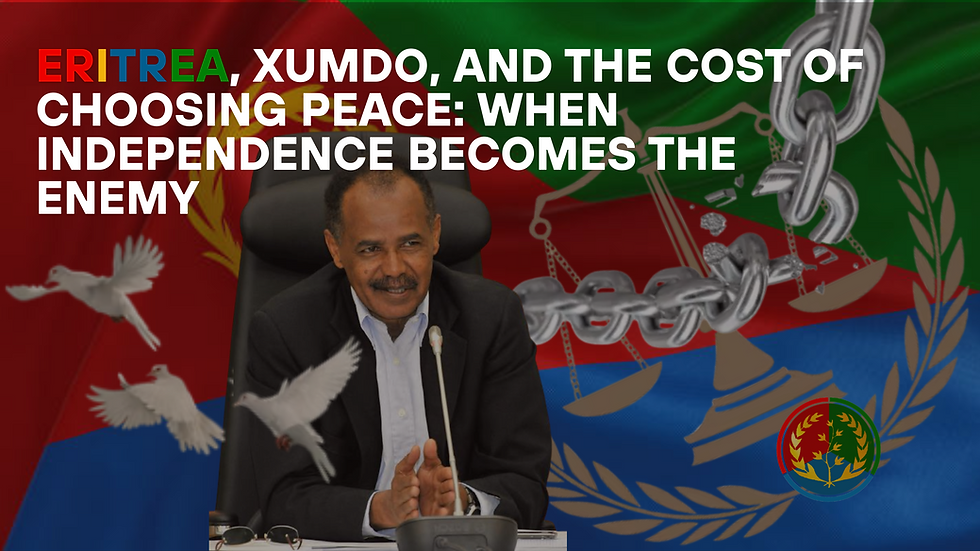
Ethiopia’s 2025 Agenda: Three Moves That Redrew the Horn’s Geopolitical Map
- Nakfa Eritrea
- Aug 10
- 3 min read
A Year That Laid Bare the Fault Lines
In 2025, Ethiopia took three major steps that not only shaped its own diplomatic profile but also shifted the geopolitical balance in the Horn of Africa.
Each of these moves — from hosting a highly controversial African Union meeting on Sudan, to maneuvering inside Somalia’s fragile political scene, to rolling out the red carpet for one of the West’s most polarizing figures — revealed a pattern: Ethiopia is playing an increasingly central role as a regional enforcer of global power structures.
The optics matter. Ethiopia is positioning itself not merely as a local power, but as a trusted gatekeeper for Western interests on the African continent. But in doing so, it risks alienating its neighbors, undermining African unity, and deepening the perception that its actions serve external agendas over regional sovereignty.
The Sudan Conference Without Sudan
In early 2025, the African Union, hosted in Addis Ababa, organized a high-level meeting to address the ongoing humanitarian crisis in Sudan. On paper, this looked like a constructive step. In practice, it turned into a diplomatic scandal: no Sudanese officials were invited.
The event was led prominently by Ethiopia and Kenya — two governments widely viewed by African analysts as aligned with Western political priorities. By excluding Sudan’s own leadership, the AU signaled that it was willing to set aside principles of national sovereignty when it suited the agendas of its most powerful member states and their backers.
The exclusion was not a mere oversight; it was a deliberate act of control. It demonstrated how the AU — with its headquarters firmly planted in Ethiopia — can be used as a tool to direct African affairs without the full participation of those most affected.
In effect, Addis Ababa became the stage for an Africa-branded policy show where decisions about Sudan were shaped without Sudanese consent, reinforcing the perception that the AU’s current setup enables gatekeeping rather than genuine continental democracy.
Somalia: Security Policy or Strategic Leverage?
January 2025 saw the transition from the AU’s ATMIS peacekeeping mission to the new African Union Support and Stabilization Mission in Somalia (AUSSOM). Ethiopia quickly secured a prominent role in this new framework, contributing thousands of troops.
But the shift came against a backdrop of rising tensions between Ethiopia and Somalia over access to Red Sea ports. Addis Ababa had been openly pressuring Somalia for a port agreement, even hinting at recognizing Somaliland in exchange for such access — a move that struck at the heart of Somali sovereignty.
By embedding itself within AUSSOM, Ethiopia effectively gained a stronger operational presence inside Somalia at the same time it was leveraging port access demands. For critics, this wasn’t about peacekeeping; it was about strategic positioning — using AU and international security structures to extend Ethiopia’s influence while negotiating from a position of strength.
The message to the Horn was clear: Ethiopia could act both as a peacekeeper and as a regional power pursuing its own national interests, even when the two roles conflicted.
Bill Gates in Addis Ababa: The Symbolism of Alignment
In June 2025, Ethiopia’s Prime Minister Abiy Ahmed awarded Bill Gates the country’s highest honor, the Order of Nishan. The ceremony was lavish, the rhetoric glowing — Ethiopia was celebrating Gates as a hero.
But this was no neutral gesture. Gates is a polarizing figure across much of Africa. Critics point to his heavy promotion of genetically modified crops, his foundation’s involvement in public health programs tied to controversial partners like Planned Parenthood, and the broader suspicion that his philanthropic empire doubles as a vehicle for influencing global food, health, and population policies.
Many African activists view such influence as part of a broader pattern of neo-colonial intervention through “development” programs — a pattern Ethiopia appeared to endorse by giving Gates a hero’s welcome. This decision also stood in contrast to moves in other countries, where political and civil society voices have pushed back strongly against Gates-backed initiatives.
Combined with Ethiopia’s diplomatic moves in the AU and Somalia, the Gates reception reinforced an image of alignment with Western technocratic agendas over grassroots African-led solutions.
Conclusion — Ethiopia’s Role as a Gatekeeper State
Taken together, these three events form a single through-line: Ethiopia is acting as a gatekeeper state in the Horn of Africa, facilitating and legitimizing Western-aligned strategies on the continent.
In Sudan, it hosted a meeting that sidelined the very nation at the heart of the crisis.
In Somalia, it expanded its security footprint under the cover of peacekeeping while advancing its own port access ambitions.
And in Addis Ababa, it rolled out the red carpet for a figure deeply associated with corporate-driven development models that many Africans reject.
Whether viewed as pragmatic diplomacy or as dangerous subservience to external interests, Ethiopia’s 2025 agenda has left an undeniable mark on the Horn’s geopolitical map — one that other African states, and African citizens, will be judging for years to come.
.png)



Comments